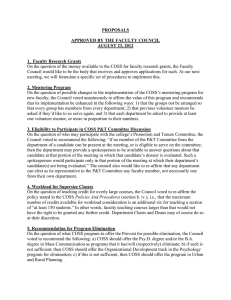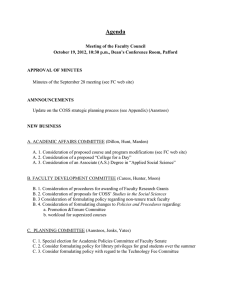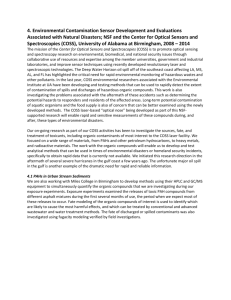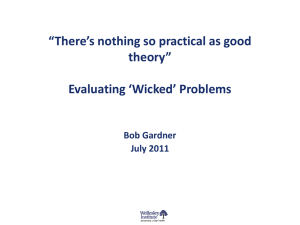Equity in access, equity in outcomes
advertisement
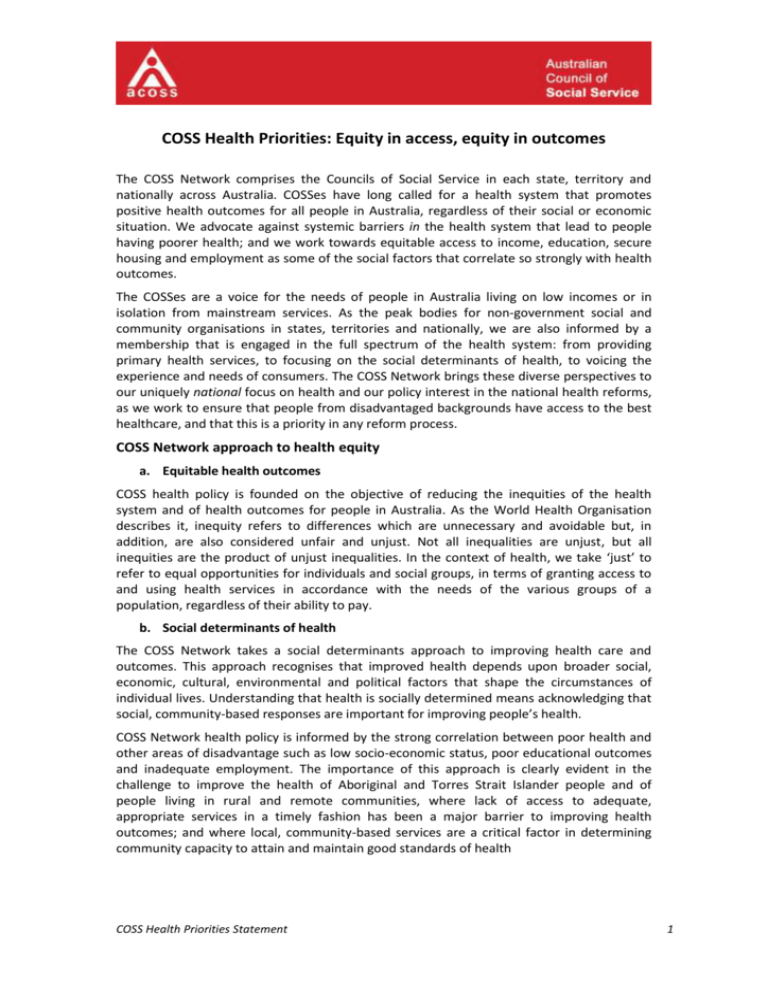
COSS Health Priorities: Equity in access, equity in outcomes The COSS Network comprises the Councils of Social Service in each state, territory and nationally across Australia. COSSes have long called for a health system that promotes positive health outcomes for all people in Australia, regardless of their social or economic situation. We advocate against systemic barriers in the health system that lead to people having poorer health; and we work towards equitable access to income, education, secure housing and employment as some of the social factors that correlate so strongly with health outcomes. The COSSes are a voice for the needs of people in Australia living on low incomes or in isolation from mainstream services. As the peak bodies for non-government social and community organisations in states, territories and nationally, we are also informed by a membership that is engaged in the full spectrum of the health system: from providing primary health services, to focusing on the social determinants of health, to voicing the experience and needs of consumers. The COSS Network brings these diverse perspectives to our uniquely national focus on health and our policy interest in the national health reforms, as we work to ensure that people from disadvantaged backgrounds have access to the best healthcare, and that this is a priority in any reform process. COSS Network approach to health equity a. Equitable health outcomes COSS health policy is founded on the objective of reducing the inequities of the health system and of health outcomes for people in Australia. As the World Health Organisation describes it, inequity refers to differences which are unnecessary and avoidable but, in addition, are also considered unfair and unjust. Not all inequalities are unjust, but all inequities are the product of unjust inequalities. In the context of health, we take ‘just’ to refer to equal opportunities for individuals and social groups, in terms of granting access to and using health services in accordance with the needs of the various groups of a population, regardless of their ability to pay. b. Social determinants of health The COSS Network takes a social determinants approach to improving health care and outcomes. This approach recognises that improved health depends upon broader social, economic, cultural, environmental and political factors that shape the circumstances of individual lives. Understanding that health is socially determined means acknowledging that social, community-based responses are important for improving people’s health. COSS Network health policy is informed by the strong correlation between poor health and other areas of disadvantage such as low socio-economic status, poor educational outcomes and inadequate employment. The importance of this approach is clearly evident in the challenge to improve the health of Aboriginal and Torres Strait Islander people and of people living in rural and remote communities, where lack of access to adequate, appropriate services in a timely fashion has been a major barrier to improving health outcomes; and where local, community-based services are a critical factor in determining community capacity to attain and maintain good standards of health COSS Health Priorities Statement 1 c. Health promotion, prevention and early intervention Good health can be achieved through health promotion and prevention of illness, which is best fostered through communities and community services. There is a substantial and growing evidence-base within Australia1 and internationally2 that the prevention of problems, and intervening early when problems do arise, will manage the growing demand for acute services and contain rising health care costs. Not only will this approach create a more sustainable health care system, but the evidence indicates that health care systems orientated around wellness through health promotion, prevention, and early intervention are more efficient and effective as they reduce inequity of health outcomes experienced by disadvantaged groups, and improve overall health and wellbeing of the general community. COSS health policy priorities The following issues are common health policy priorities across the COSS Network, beyond any areas that COSSes may work on individually. 1. Equity and Access There are a range of structural barriers that inhibit equitable access to health care and that cause or compound health inequities. These include costs of care and fees for consumers; low health literacy, poor access to health service information by consumers; and unavailability of timely, quality services in parts of the country. Chronic health conditions also exacerbate disadvantages faced by some health consumers, particularly those on low incomes or who are isolated from services by their geographic location. The COSS Network health policy is concerned with addressing these structural barriers to equity of access to health care inherent in Australia's health system. In addition to inequitable access to health services and treatment, COSSes focus on inequitable population health outcomes. These include: Aboriginal health – incorporating and supporting the Close the Gap priorities. Rural and remote health – ensuring access to timely, adequate health care in rural and remote settings. Oral health - relating broadly to key health inequities for people on low incomes. Mental health - relating broadly to key health inequities for people on low incomes. Of these priorities, COSSes concentrate on oral health and mental health. We prioritise these areas in our work because people’s oral health and mental health status effect and are affected by economic and social status. Too often, poor oral health and mental illness go unchecked in our community. Poor oral health is one of the clearest markers of disadvantage, making people uncomfortable to attend job interviews, apply for housing tenancies or engage in relationships. Similarly, for many people mental illness can be a contributing factor to family or relationship breakdown, homelessness, unemployment, 1 See for example Owen A et al, Community health: the evidence base: A report for the NSW Community Health Review. Centre for Health Service Development, University of Wollongong, 2008; and National Health and Hospitals Reform Commission, A Health Future for All Australians: Final Report, Canberra, 2009. 2 The Marmot Review, Strategic review of health inequalities in England post-2010, Fair Society, Healthy Lives - The Marmot Review Final Report, London, 2010. COSS Health Priorities Statement 2 substance and alcohol misuse, and can undermine existing or potential supports. Thus they are each conditions that can lead to acute illness; and can act as barriers to continued participation in economic and social life. In addition, they can have a disproportionately high and sometimes disastrous impact on people living on low incomes or in rural or remote areas. For many people living in Australia, poor oral health or mental illness compounds and are compounded by low income. Yet both are conditions that can be managed effectively if people have access to appropriate, affordable and ongoing services and supports in the community. 2. Primary health care Primary health care is a clear indicator for success in population health outcomes. Health promotion, prevention and early intervention services and equitable access to timely treatment and care in the community are essential to keep people well and reduce health inequities. This focus determines our approach to health policy broadly, as well as to specific processes such as the National Health Reform Agenda. In these reforms, the establishment of Medicare Locals has been one of the key initiatives in relation to primary health care. We work to ensure that Medicare Locals have a solid grasp of the population health needs and the inequities that people face in the current health system, in order to improve access to services and health outcomes, especially for the most vulnerable. To do this, Medicare Locals must be open, transparent and established as a broad partnership of all of the stakeholders, including consumer organisations and community service providers. Only through such an approach will we ensure that issues like oral health and mental health join primary care as the core business of our health system. 3. Non-government social and community sector Adequate levels of government funding for non-government services. Recognising the importance of partnerships and expanding the scope for them. Developing mechanisms for improved participation at local and community levels. Identifying existing and emerging networks of interest in health policy and health reform. The non-government social and community sector plays a vital role in achieving better health outcomes for people affected by poverty and disadvantage. Social and community services respond to and meet the changing and diverse needs of local communities and priority population groups. More broadly, they provide a wide range of services to assist people to live within an holistic framework that promotes and maintains good health within communities. The membership of the COSS network comprises a diverse range of community, health and consumer organisations. Drawing on the combined knowledge, expertise and experience of our members gives us a unique insight into the possibilities of a health system that is supported by a strong community sector. Simultaneously, the structure of the COSS network means that we are engaged with each of the Australian governments whose own policies are such key drivers of the health system in Australia. Our areas of focus within the community sector enable us to direct our expertise to the opportunities that a dynamic and effective community sector can offer in the improvement of access and equity in health. COSS Health Priorities Statement 3

